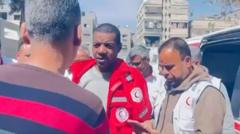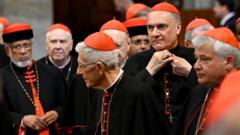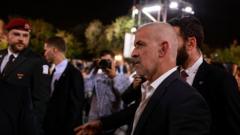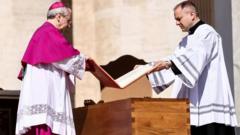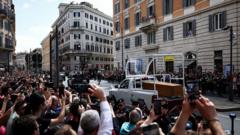In the wake of Pope Francis's passing, Israel's response has stirred controversy and reflected political tensions tied to the Gaza conflict.
Muted Response from Israel Highlights Unresolved Tensions Following Pope Francis's Death

Muted Response from Israel Highlights Unresolved Tensions Following Pope Francis's Death
Israel's delayed condolences and low-key funeral attendance for Pope Francis reflect ongoing conflicts regarding Gaza.
The Israeli Prime Minister Benjamin Netanyahu's office finally expressed its condolences four days after Pope Francis's death, alongside the withdrawal of a previously warmer message shared on social media, which added to controversy within Israel. The official statement, posted late Thursday, was muted: "The State of Israel expresses its deepest condolences to the Catholic Church and the Catholic community worldwide at the passing of Pope Francis. May he rest in peace."
Interestingly, the prior message featured a photograph of the Pope praying at the Western Wall in Jerusalem and concluded with "May his memory be a blessing," but was quickly deleted without explanation. Israeli media report it was taken down after being labeled an error by the foreign ministry.
In comparison to the prominent international delegations attending the funeral, Israel is sending its Vatican ambassador, Yaron Sideman, a far lower-profile representation than the official delegations from major countries, including U.S. President Donald Trump. This contrasts starkly with the funeral of Pope John Paul II in 2005, where Israel was represented by both the president and the foreign minister.
While President Isaac Herzog shared a heartfelt tribute shortly after the Pope's death, stating Francis represented profound faith and compassion, there are no plans for him to attend the funeral. Reports suggest scheduling conflicts with the Jewish Sabbath may play a part in this absence.
The Israeli administration's reluctance to openly honor Pope Francis stems largely from his vocal support for Palestinians during the Gaza conflict, which has stirred resentment in segments of Netanyahu’s coalition government. Last year, the Pope called for international scrutiny of Israel's military actions in Gaza, provoking strong denials from Israeli officials, and he described the humanitarian plight in Gaza as "shameful."
Moreover, his expressions of empathy towards the Palestinian community and their struggles have resonated deeply, as evidenced by the Palestinian Authority sending Prime Minister Mohammad Mustafa to the funeral, signaling the respect held for the Pope amongst Palestinian leaders.
Consequently, the growing rift between the Israeli government and the Vatican appears likely to manifest prominently during Pope Francis's funeral in Rome, shedding light on the intertwined complexities of faith and international relations within the context of ongoing conflict.
Interestingly, the prior message featured a photograph of the Pope praying at the Western Wall in Jerusalem and concluded with "May his memory be a blessing," but was quickly deleted without explanation. Israeli media report it was taken down after being labeled an error by the foreign ministry.
In comparison to the prominent international delegations attending the funeral, Israel is sending its Vatican ambassador, Yaron Sideman, a far lower-profile representation than the official delegations from major countries, including U.S. President Donald Trump. This contrasts starkly with the funeral of Pope John Paul II in 2005, where Israel was represented by both the president and the foreign minister.
While President Isaac Herzog shared a heartfelt tribute shortly after the Pope's death, stating Francis represented profound faith and compassion, there are no plans for him to attend the funeral. Reports suggest scheduling conflicts with the Jewish Sabbath may play a part in this absence.
The Israeli administration's reluctance to openly honor Pope Francis stems largely from his vocal support for Palestinians during the Gaza conflict, which has stirred resentment in segments of Netanyahu’s coalition government. Last year, the Pope called for international scrutiny of Israel's military actions in Gaza, provoking strong denials from Israeli officials, and he described the humanitarian plight in Gaza as "shameful."
Moreover, his expressions of empathy towards the Palestinian community and their struggles have resonated deeply, as evidenced by the Palestinian Authority sending Prime Minister Mohammad Mustafa to the funeral, signaling the respect held for the Pope amongst Palestinian leaders.
Consequently, the growing rift between the Israeli government and the Vatican appears likely to manifest prominently during Pope Francis's funeral in Rome, shedding light on the intertwined complexities of faith and international relations within the context of ongoing conflict.

